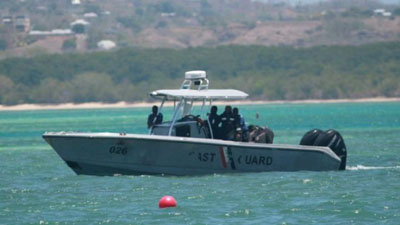by WorldTribune Staff, April 25, 2019
More than 20 Venezuelans fleeing the economic and humanitarian disaster in the socialist nation are missing after their boat which was headed for Trinidad and Tobago capsized in rough seas, reports say.
The incident occurred in the early morning hours of April 23 as the fishing vessel was reportedly transiting a popular route for refugees and migrants who pay traffickers $250 for the journey to Trinidad. The vessels usually sail at night and dock in quiet coves or jetties, authorities say.

The Venezuelan and Trinidadian Coast Guards reported rescuing nine survivors. Two, including the boat’s captain, were found clinging to floating oil drums in the Gulf of Paria.
The boat’s official manifest recorded 25 passengers, but sources say additional passengers boarded unlogged, The Guardian reported. Most of the passengers were women.
The April 23 incident was reminiscent of the thousands of “boat people” who fled communist Vietnam between 1975 and 1995. WorldTribune editor Robert Morton, then a Tokyo-based correspondent, interviewed many of the surviving “boat people” including a former photographer for the Washington Post Saigon bureau. “I was struck by the reluctance of the foreign press corps in Japan to cover this story involving victims of communism,” he said.
“Vietnamese remember that in addition to the 255,000 boat people who reached the shelter of the miserable refugee camps, thousands drowned at sea, often refused entry by neighboring countries,” WorldTribune.com columnist Sol Sanders noted.
About 2 million people fled Vietnam after the fall of Saigon.
The United Nations high commissioner for refugees (UNHCR) and the Trinidadian government estimate that 40,000 Venezuelans are living in Trinidad, of whom 10,000 have registered as asylum-seekers with the UN refugee agency.
Refugees in Trinidad currently have no employment rights, which forces them to work illegally.
“Many are exploited, paid shockingly low wages and some resort to sex work to supplement their incomes. Sex trafficking rings have been uncovered by the Trinidadian police,” The Guardian reported.
The Trinidadian government recently announced an amnesty on all Venezuelans living in the country – including those who entered illegally – that will allow them temporary work permits.
Trinidad’s minister of national security, Stuart Young, has said that after one year refugees will be expected to return to Venezuela. Concerns have been expressed about how the government will handle the data and whether it will be shared with Venezuelan dictator Nicolas Maduro.
According to government figures, 3 million Venezuelans have left since the crisis began.
Your Intel Brief: Geostrategy-Direct __________ Fix The Media Now
